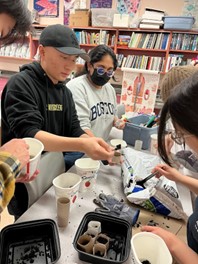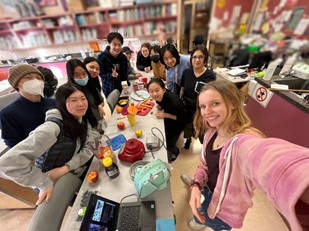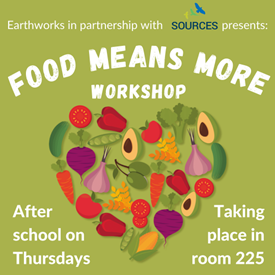Shared by Kristy Harrison
A group of student change-makers from the Earthworks Club have been undergoing a food waste reduction journey. Through 5 weeks of a 6-part workshop series, students have made food rescue smoothies, constructed kale seedling planters, and implemented strategies and perspectives within their homes and lives. Workshoppers are gearing up to design their own awareness campaigns to affect positive change in the school community. Using their newfound environmental and social knowledge, students will continue their community engagement through food waste reduction.
It was inspiring seeing everyone engaged in food waste reduction practices that are applicable to their lives yet impactful. They also had lots of fun!
This workshop series has been brought to us by Sources Food Hub, a branch of the non-profit Sources Community Resource Centres. Sources Regional Food Hub works to reduce food waste, through civic-based education and redistribution of recovered food in the community. The Food Hub’s focus is on collaboration, through the rescue and redistribution of food from grocery stores to food banks and community partners. Food waste reduction education tackles food waste at its source. Formerly, this has taken place in one-off community events. This new workshop model aimed for secondary students tackles wider issues of food waste, like hunger and climate change through shifting perspectives of the ability of our actions to make a difference.
The workshop series is therefore aptly named “Food Means More,” illustrating the endless potential of undergoing journey built on awareness to foster a continuous commitment to change. To learn more or connect about getting “Food Means More,” to a class or club group at your high school, contact Sara Humphreville, the Community Engagement Coordinator with Sources at shumphreville@sourcesbc.ca.
Let’s keep creating change!
Pictured is the group planting kale seedlings in handmade paper pots from toilet paper rolls and the group making a smoothie with ingredients that were at risk of food waste from their homes. Food Means More poster created by Grade 12 student Zoe Klein.



